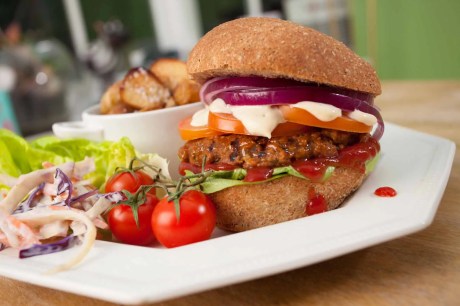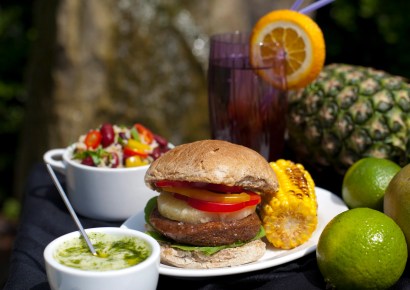John and Midge are authors and co-founders of the publishing house Ashland Creek Press, which is dedicated to animal and environmental literature.

How and why did you become vegan?
It was a journey that predates Ashland Creek Press. We both took different journeys but arrived at the same destination. And the more we learned about animals and how they are treated, the more this affected every aspect of our lives, including our writing. Ashland Creek Press grew out of desire to see more works of literature that address animal rights issues.
How did you come to writing and publishing?
Midge: We both have journalism backgrounds, and we both worked in publishing in New York. This is when I first began writing fiction. After publishing a number of short stories, my first collection, Forgetting English, was published in 2009, and my novel, My Last Continent, was published this year by Text Publishing. Ashland Creek Press was born thanks to John’s novel, The Tourist Trail, which we published in 2010 after his agent couldn’t find a home for it. This experience made us realize that there is a lot of environmentally themed literature that isn’t finding its way into the world, so we decided to start a boutique press with that focus.
John: While Midge has a strong background in editing, my expertise is more in web, production, and marketing. After publishing The Tourist Trail, we began accepting submissions for Ashland Creek Press and were amazed by the high quality of work we received, which told us that there was definitely a need for an environmental press. We’re now in our fifth year and have published more than twenty books.
What would you suggest for an author looking to write or promote a book about animal ethics? For one, I imagine it’s difficult to write a popular and successful book about animals ethics when so few people take animal suffering seriously.
First, we’d encourage the author to keep us in mind! Second, we’d encourage any writer passionate about these issues to not give up. In many ways, writers who tackle these issues are ahead of their time — but our time will come eventually.
Regarding the writing itself, it’s important that writers understand their audience and what they’re trying to achieve with their work. Some writers are successful in writing for fellow vegans, and their work reflects this. But to write a novel that will appeal across the full spectrum of readers, one must be careful not to be heavy handed in style and voice. You want readers to share your journey, and you must always keep in mind that those who are not vegans might not take the same path that you took. The goal is to open hearts and minds toward these issues by asking important questions in a way that respects where every reader is coming from.
What skills would you suggest are most valuable to learn early for starting and running a great business?
Start small and keep overhead low. We didn’t “give up the day jobs” when starting this press, and we still have other work to help make ends meet. And this gives us the financial freedom take chances on books that fall outside of the mainstream.
Also, a lot of people view publishing as an easy business to run because of the rise of self-publishing models and eBooks. But there are more than 200,000 books published every year, which makes book marketing a constant and never-ending challenge. In other words, we would not recommend that people get into publishing to make money but rather to pursue their passions. It’s definitely a labor of love.
What is it about fiction that allows a message to be communicated better than non-fiction?
Non-fiction speaks to the brain; fiction speaks to the heart. And while we find that non-fiction books have a huge impact on awareness and action (we also publish non-fiction, such as Dogland), we have special affinity for fiction. We’re readers and writers of fiction ourselves and are continually frustrated by the lack of novels that see the world the way we see the world.
What is your biggest insight on encouraging regard for animals, either in print or in person?
Empathy is the key. Most people have empathy for their family pets, and they may not realize, for example, that pigs are as intelligent as their dogs. The challenge is helping them expand their love for such pets as cats and dogs to animals that have largely been overlooked. One strategy is by giving an animal point of view in a story — not an easy feat but, done well, can be quite successful, as it was with the cockatoo Caruso in Gwyn Hyman Rubio’s Love and Ordinary Creatures. Other ways we can find empathy for animals in fiction is by authors creating unforgettable animal characters that live among humans, such as Jata in Mindy Mejia’s The Dragon Keeper. And both editions of Among Animals feature animals from dogs and cats to emus and cockroaches, all of which challenge us to view these creatures in a new light.
What one movie, piece of literature or other medium has most shifted your views?
John: It’s hard to pick just one. Some of the more influential books in my life include Moby-Dick by Herman Melville, Elizabeth Costello by J.M. Coetzee, The Lathe of Heaven by Ursula K. Le Guin, The Crossing by Cormac McCarthy, and the story A Report to An Academy by Franz Kafka. When it comes to television, the British mini-series Edge of Darkness continues to inspire me.
Midge: I am a big fan of environmental novels like Ann Pancake’s Strange As This Weather Has Been and Barbara Kingsolver’s Flight Behavior. Karen Joy Fowler’s We Are All Completely Beside Ourselves beautifully touches on important animal-rights issues. I also think film is a wonderful medium for the animal rights, especially as there are so many good films that tackle the subject from different angles, from Forks Over Knives to Earthlings to Cowspiracy.
What is one thing that you believe which almost no one else does?
We have long made the point that often widely acclaimed “environmental literature” isn’t truly environmental in that nature is exploited rather than respected. We are working hard to promote a “new environmental literature” that doesn’t glorify hunting, fishing, or any form of extraction from nature. We’ve founded the Siskiyou Prize for New Environmental Literature (www.siskiyouprize.com) specifically to highlight these works. We believe we’re due for a revolution in environmental literature.
What’s next for you?
For ACP, we’ve just published the second volume of Among Animals, an anthology of short stories that explore human-animal relationships.
We also just launched the third annual Siskiyou Prize for New Environmental Literature.
Next year we will be publishing the novel The Crows of Beara, about Ireland, nature versus industry, and the power of landscape. We’ve also just signed a non-fiction book about wild bears of Europe. Most people aren’t aware that there are bears there, and this book sheds light on the struggles that they face, as well as the people who advocate on their behalf.
And we’re also both writing new novels.
Thanks for sharing your time! If you want more information about Ashland Creek Press, check out their website.
I’m hoping for interviews with interesting people doing interesting things will become a regular segment. If you enjoyed this and want to hear more stories, make sure to subscribe. And if you have any interesting stories/experiences/wins you’d like to share, please do get in touch so I can interview you!







